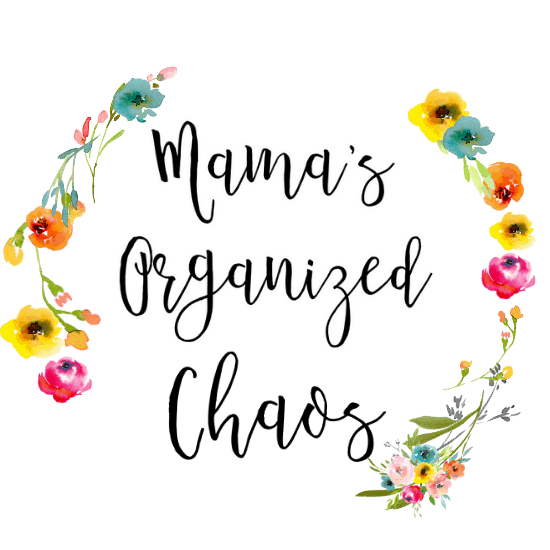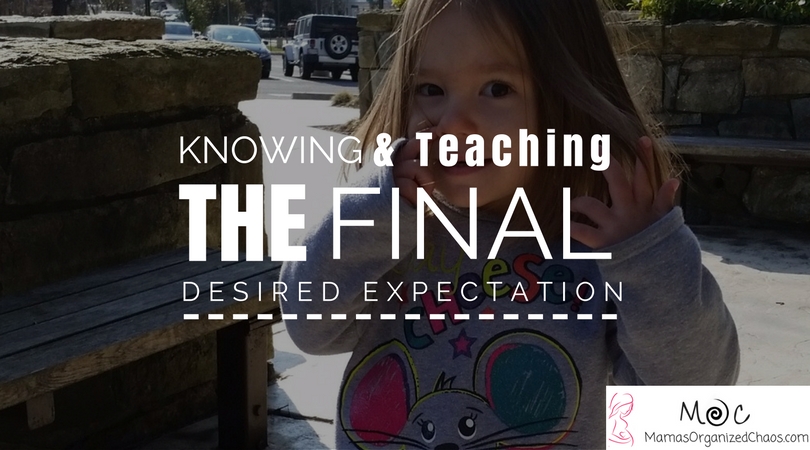Discipline. What does that word mean to you?
Webster defines discipline as “The practice of training people to obey rules or a code of behavior, using punishment to correct disobedience.”
I’d like to alter this definition slightly- “The practice of training people desired behaviors based on expectations, using a proactive approach and consequences when necessary”.
I probably wouldn’t have phrased it the way Webster did to begin with, but with some simple alterations, I think my idea comes across. To me, discipline is the big picture, not just the response. It incorporates who, what, when, why, and how. In order to discipline effectively, all of these questions need to be thought through, a plan devised, and consistency provided.
In my journey to find our “discipline” method, and what works well for our family, I find myself coming back to the root of the idea: expectations. Without expectations, there would be no disciplinary action.
My husband and I believe in setting high expectations. We believe that, if we set high expectations, our daughter will rise to the challenge. I used the same idea when teaching high school, and I am a firm believer that it works. It not only provides a challenge for children that they are often longing for, it shows them that you believe in them.
In addition to setting high expectations, I think it is important to know the end goal. What is the final expectation, not the “right now expectation”? The final expectation is the real expectation that needs to be taught and focused on.
Here’s what I mean by this: We have a final expectation that our daughter say thank you at all times that it is appropriate to do so. Our final expectation is that she says thank you on her own (without being prompted), whether we are around or not, and to anyone that does something nice for her, in any situation.
She’s 2 years old at the moment (27 months). In the last week or so, she’s really taken off with saying thank you all on her own, completely unprompted. She does this with my husband and I incredibly well. She has not yet mastered saying thank you to others, as it makes her nervous. She knows our expectation, however, and we are working on it together.
When she was 1.5 years old, she was not able to say the words “thank you”. She still understood our expectation however, because we had made it known to her. She rose to the challenge, and said thank you at appropriate times, all on her own, in her own little way. She said “yaya” as her way of saying thank you. She did the best she could using the tools the had available to her, and she was very consistent with it.
Even before she was able to say “yaya”, we still had the expectation put out there. She has been hearing that she needs to say thank you since practically the moment she was born. Even when she couldn’t talk, we set the expectation by asking her to say it and saying thank you for her, explaining when she should say it, modeling the behavior, and more. She’s known this expectation for a very long time now and, as she’s been able to master parts of the expectation, she’s done so. Setting the expectation early, set her up to learn this expectation very well and at a young age.
Once you’ve decided on your final expectation, it’s time to make a plan. I can’t reasonably expect my 1 year old to say the actual words “thank you”. This means that we need to find a way to set the end goal, but set reasonable reactions and responses when the end goal cannot yet be mastered. It is also important to provide learning along with the expectation. One cannot simply set an expectation and not teach the behavior. I also find it valuable to put the expectation on myself. It is my job to teach my daughter so she can rise to the expectation. It is not her job to learn how to get there.
Things to keep in mind:
Scaffold: “In education, scaffolding refers to a variety of instructional techniques used to move students progressively toward stronger understanding and, ultimately, greater independence in the learning process.” Instead of altering the expectation to fit the level of ability, keep the expectation set high, and keep it to be what you desire the final expectation to be. Adjust how much you are helping your little one in achieving this goal.
Now that my daughter is 2 (27 months), I give her ample wait time before prompting her to say thank you. I know that she is to the point that she knows to say it and can say it, so I am now providing her the opportunity to do it on her own.When she was closer to 24 months, however, I prompted her immediately, every time. She still needed that scaffolding to help her, and then she could say thank you.
Know your response: You know best if your child is capable of achieving the desired final expectation. Depending on their level of ability, your response should be adjusted. When my daughter was 1.5 years old, she was saying “yaya” instead of thank you. I knew that she wasn’t physically able to say the words thank you yet, so I praised her for trying. She was doing the best she could and saying thank you the only way she knew how.
It is important to keep your child’s abilities in mind as you determine your response. I’m only going to respond with consequences if I know that my child knows how to say thank you, when to say thank you, and is emotionally capable of saying thank you in the situation. When all of those things align, and her abilities are there, then I will start enforcing consequences- if she decides not to say thank you for her ice cream, then she won’t be getting the ice cream. Those consequences can only be enforced if she’s capable and understands, however.
Don’t get frustrated: Try to stay calm and think through your plan. Keep abilities in mind as we just discussed, and remember the response that you determined to be appropriate. Remember that your child is learning a behavior and they need to practice. Just because they said thank you yesterday, doesn’t mean they automatically know to say it today. Learning is a process and doesn’t happen overnight, or just because you tell them to do something, or set an expectation. I must have said “say thank you” a million times at this point (and it will continue). It would be very frustrating if I lost sight of the fact that my daughter is trying and very eager to please. She’s doing her best and that’s what I focus on.
Stay Positive: Focus on all the little accomplishments that are getting you closer to the final expectation. Don’t just focus on the fact that your child isn’t meeting the expectation yet. The majority of the learning process, they will not yet have met the expectation. Using the “thank you” expectation again… remember that your child once had no idea they were supposed to say thank you. Remember the successes and focus on how far you’ve come. Learning takes time.
Praise Good Results: Praise, praise, praise! As your child is learning a new concept, they are so eager to please you. As you see your child learning and trying, make sure to make a big deal out of it and praise them. Praise them for trying, praise them for a job well done, etc. Make sure you distinguish between the two. Don’t say “great job” if your child didn’t meet the expectation. Instead, say “thank you for trying”, when you notice the effort put in. This tells your child that you noticed, that you are proud, and also let’s them know they still have work to do- in a positive way.
My daughter is now to the point that she notices and corrects my behavior at times! If I ever say yeah, she is on it and tells me not to say “yeah”, but to say “yes please”. While, she’s not able to understand when it is ok to say yeah, versus yes, she’s trying, and she’s trying to the point that she’s noticing my behavior. That’s amazing and worth celebrating! So, while I want to explain to her that it’s ok to say yeah the way I did, and that yes please wouldn’t have made sense, I know that she’s not going to understand that yet, and that regardless… her observation of my behavior is a huge win! So we celebrate and praise a job well done!
Setting high expectations provides consistency to your child and to your focus. You can set smaller goals as a part of your scaffolding if you choose, just make sure to not lose site of the end goal. Teach to the end goal, and assume that your child is capable of learning the concept. I think it is so important to not set limits on learning. Reach for the sky! When it comes to your response, however, remember what their abilities are showing they are currently capable of and respond to that. Don’t assume that they can meet the expectation right off the bat. Be reasonable and respond accordingly. Focus on the positive and your child will get to the end goal faster than you think. We’ve had such great success using this tactic with our daughter. We’ve used this tactic for things like saying please and thank you, saying sorry, and what she’s sorry for, to cleaning up, helping others, learning to control her emotions, and so much more.
Other posts of interest:
Teaching Responsibility- Involving Your Toddler In Household Tasks
The Behaviors Learned in Gymnastics
Teaching Your Child To Be a Giver
5 Crucial Lessons To Teach Your Child That You Should Start Now
Promoting Positive Behavior by Offering Choices to Your Toddler
Little Echoes (teaching compassion)
Expressing and Identifying Emotions
MONTH 26 Schedule and Milestones
The ladies of the Babywise Friendly Blog Network are all blogging on discipline this week. Check them out on these days:
Monday: Valerie at Chronicles of a Babywise Mom
Tuesday: Natasha at Let’s Be Brave
Wednesday: Katrina at Mama’s Organized Chaos and Shea at The Moses Home
Thursday: Kimberly at Team Cartwright and Carrie at Wiley Adventures
Friday: Emily at The Journey of Parenthood and Cole at Twinning Babywise



